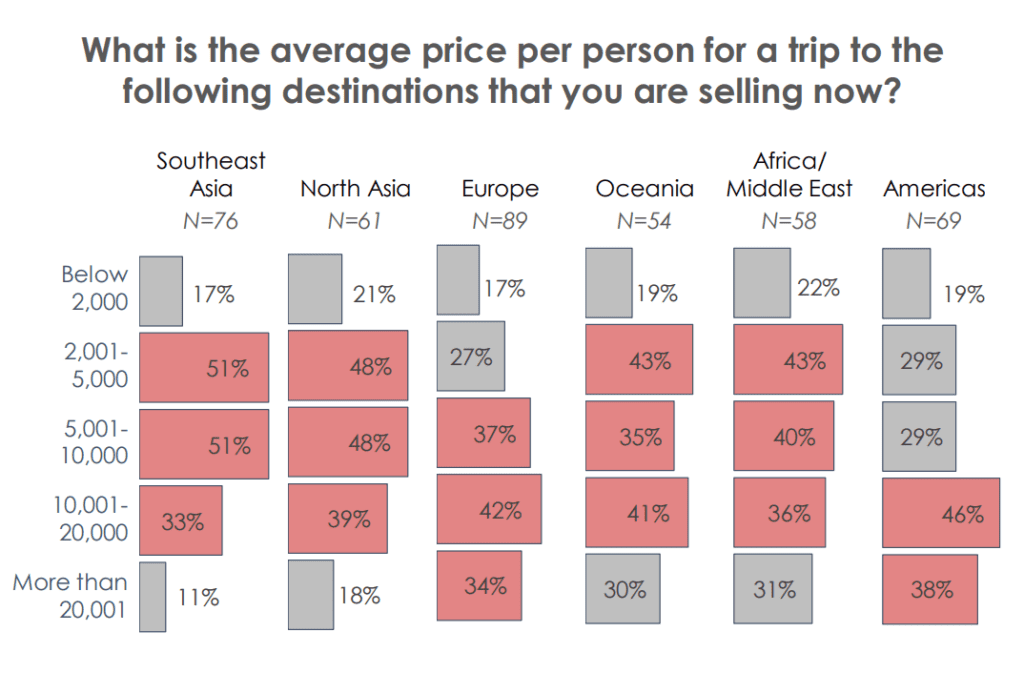Skift Take
The younger demographics actively engaging with travel agents underscores the need for adaptation. Agents are blending traditional and digital methods to connect with clients, staying relevant by catering to their evolving preferences.
As Chinese travel agents embrace modern communication channels to stay relevant, a survey by Dragon Trail Research has found that millennials and those born after the 1990s are the driving force behind the travel agent business in China.
The widely popular messaging platform, WeChat, plays a crucial role: A majority of travel agents reported making sales through their official WeChat accounts.
Riding on China’s livestreaming frenzy, travel agents are also using the medium as an online marketing and sales channel. Livestreaming sales in China reached $480 billion last year and are projected to grow by 30% this year, according to research firm eMarketer.
Top Challenges: Visa Wait Times and High Prices
Dragon Trail Research conducted an 18-question online survey of travel agents currently selling outbound travel for mainland Chinese travel agencies.
The survey findings highlight the challenges since China reopened its borders over six months ago. Obtaining visas and high prices, particularly airfares, have been major hurdles. Additionally, many remain hesitant to venture abroad.

Skift Research’s State of Travel 2023 report also found that high prices and inflation are significantly influencing purchasing decisions among Chinese consumers.
China’s second-quarter GDP released last week fell short of expectations, indicating that cautious consumer confidence is acting as a drag on the economy’s fragile progress.
The Dragon Trail survey delved deeper into the pricing dynamics for different regions. Trips to the Americas and Europe commanded the highest prices, with a little less than half of the respondents reporting trip costs between $1,395-$2,789 per person and some saying it costs even more.
On the other hand, trips to Southeast and North Asia fell within the relatively more accessible price range of $279-$1,395 per person.

Where Will The Chinese Travel to in 2024?
Despite visa issues and high-priced tickets, Europe emerges as the most promising destination.
Ranking second and third on the list of potential outbound travel destinations for 2024 are Southeast Asia and North America.

The survey also shows rising interest in Central Asia, Oceania, and the Middle East.
Despite North Asia being a region where 60% of travel agents currently offer travel packages, there is a sense of caution and relative pessimism regarding the potential for sales to this region in the upcoming year.
Skift’s State of Travel noted a decline in long-haul travel from China. However, it also highlights the persistent wanderlust among Chinese travelers for international trips, with dreams of exploring Europe and North America topping the list.
Quality and Comfort Trump Low Prices
Shedding light on the evolving trends in outbound travel, the survey reveals that independent and small group travel experiences have taken center stage.
Notably, the trend leans towards smaller group sizes of 20 people or fewer, indicating a shift towards more personalized and intimate experiences.
According to the Chinese travel trade, customers now prioritize quality and experiences over enticing low prices when booking their travel. Surprisingly, low prices rank the lowest in terms of significance when it comes to customers choosing their travel options.
A Skift Deep Dive on The New Chinese Traveler earlier this year had also highlighted that the significant pent-up travel demand in the China market will overcome any sensitivity to price increases.
This shift emphasizes the importance of curating meaningful journeys that cater to the growing demand for authentic and enriching travel experiences.
Get Skift Research
Skift Research products provide deep analysis, data, and expert research on the companies and trends that are shaping the future of travel.
Have a confidential tip for Skift? Get in touch
Tags: asia monthly, china outbound, Chinese tourists, coronavirus recovery, gen z, millennials, travel agents, Travel Trends, wechat
